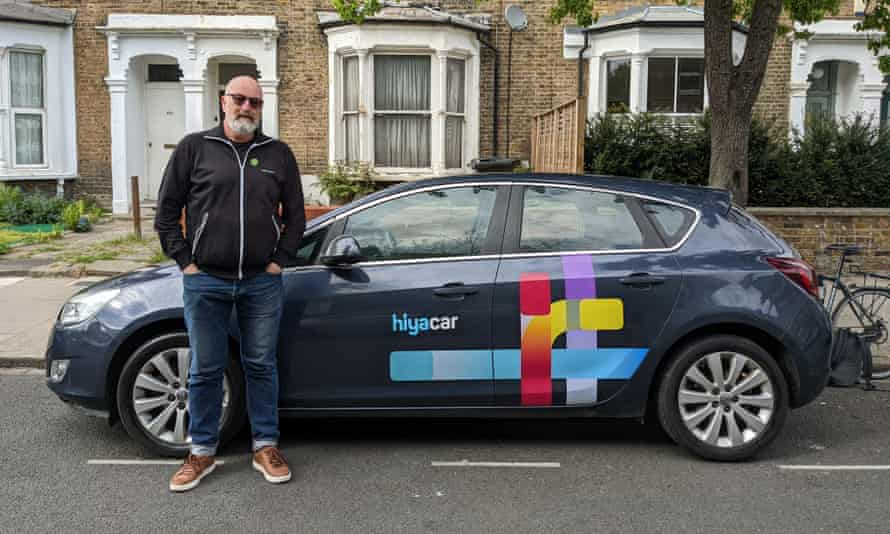It has been two years since Richard Scarborough ditched his ageing diesel vehicle in favour of using car clubs, and the 60-year-old graphic designer from Hackney says he can’t see himself ever going back.
In Oxford, Emily Kerr is part of a carshare in which 20 households share seven neighbour-owned vehicles. She is so delighted with the way it has gone that she has started helping others set up similar schemes.
Scarborough and Kerr are among the growing number of people who have found that it is perfectly possible to get around without owning the car they drive by hiring or sharing one an hour at a time.
“Most cars sit unused for the vast majority of the time, so it makes perfect sense for communities to share them,” Kerr says. “It’s better for the environment, and it’s certainly better for your bank balance.”
It has been six months since she set up ShareOurCars in east Oxford and she says it is hard to imagine how it could have gone better. Hers is a “closed loop” carshare scheme, meaning only those who live locally can use it, provided they don’t have a poor driving history.
The group partnered with the carshare provider hiyacar, which vets new entrants, provides the online booking system, and the all-important insurance. The cars are owned by individual members of the scheme.
Two months into the project, Kerr sold the family Honda SUV to use the shared vehicles instead.
“There are five cars all less than five minutes’ walk from my house,” she says. “If I need to use a car, I log on and book it, paying about £7 a hour for short hops – less an hour for longer drives. We have a WhatsApp group to talk to each other. And if I needed to get a car in an emergency, I’d be very surprised if I couldn’t get one straight away.”
She says she typically pays £90 to get a car for the weekend, usually borrowing it from someone who drives most days during the week, but rarely on Saturday and Sunday.
“Most people have quite predictable driving patterns, so you soon get to know whose car is going to be free at any one time,” she says.
She says the group have not had any serious accidents or disagreements. It helps that most of the owners view cars as a form of transport rather than their pride and joy. To get her through the summer holidays, she has just leased an MG electric car for four months, which will soon go into the car pool to be shared by other users.
“Our car used to cost us just over £300 a month in insurance, depreciation, maintenance, tax, etc. For the last six months I would say we have spent £100 on average.”

In east London, the introduction of the capital’s ultra-low emission zone meant Scarborough faced having to sell his diesel car or pay a charge of £12.50 a day to use it.
“I weighed up buying a newer car that would conform to Ulez but decided to give the carsharing schemes a go before I did, and I am so glad I did,” he says.
He generally uses his bicycle for short local trips, and a mix of car sources whenever he needs four wheels – the commercial sharing schemes Hiyacar and Zipcar, or a conventional rental from the Sixt office not far from his home.
“Getting a vehicle has never been a problem. It really helps that there are so many car clubs in this area. I am virtually assured of being able to get one – even at the very last minute,” he says.
“The cars aren’t luxury models but they do the job. Zipcar has vans which are useful sometimes.”
On average he pays about £10 an hour and his bill is typically £50 a month.
“I don’t have to worry about a big maintenance bill, and I am not adding another unnecessary car to the road. Once you are onboard with how it works, it becomes normal. For our main summer holiday last year we took the train to Scotland and then hired a campervan when we got there. In the past we would have probably driven the whole way,” he says.
Graeme Risby, the Hiyacar chief executive and co-founder, says the cost of living crisis means there has never been a better time to try car sharing.
“For us the motivation was to have fewer cars on the roads – to get communities and neighbours sharing vehicles that were often sitting unused outside people’s homes,” he says. “In the early days (2016) we wanted people to post their cars on the platform, and we provided the insurance, with anyone able to borrow the car.
“We now see the closed-loop schemes as increasingly important – particularly in rural areas. It seems people like to know that their car is being used by their near neighbours. As the national fleet moves over to electric, these schemes are going to become the future because we know not everyone can buy a £30,000-£40,000 electric vehicle.”
Want to use or set up a carshare scheme?

Provided you are at least 21 and don’t have more than six penalty points on your licence, it is easy to borrow a carshare car. There are now a host of clubs to choose from. It is all arranged online and it is a case of registering and uploading your driving licence.
Zipcar may be the best known car club but users say it has become pricier. Hiyacar is another provider that is worth a go. It has lots of cars in the UK’s bigger cities – branded cars belonging to finance firms and standard cars owned by other households. For a two-hour hire of a Seat Ibiza in Bromley this weekend, Hiyacar quoted us £11.72. Its typical daily charge is £45. There is a £500 insurance excess, meaning you have to pay the first £500 of any damage you cause, although regular users would be advised to buy excess cover from £45 a year. Generally, you return the car with the same fuel as at pickup. Cars are photographed before and after the share takes place, so any damage is noted.
If you would like to rent out your car to neighbours, it’s free to register with Hiyacar. You block out the times you need the car, leaving it available for your neighbours to use at other times. The car is insured by the club, meaning that your no-claims bonus is unaffected if a sharer has an accident, although you will face the disruption of having it repaired.
